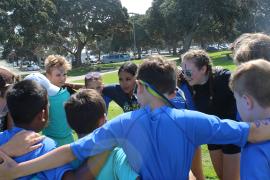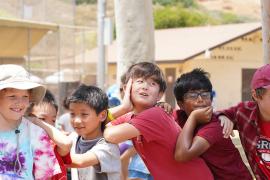An Interview with Wendy Mogel, PhD
Wendy Mogel, PhD, is a clinical psychologist with 35 years of experience, a parenting expert, a sought-after public speaker, a New York Times bestselling author, and a staunch camp advocate. Her parenting books The Blessing of a Skinned Knee, The Blessing of a B Minus, and most recently, Voice Lessons for Parents: What to Say, When to Say It, and When to Listen, help parents and other child caregivers avoid the pitfalls of perfectionism, overprotection, overscheduling, and overindulgence, and engage with children in ways that nurture, enrich, and encourage.
You are a huge proponent of camp. Does that come from personal experience?
I am a clinical psychologist because of summer camp. I went to camp from the time I was eight to an eight-week sleepaway camp each summer, as did all the kids I knew. I loved it. We didn’t have to think about anything but developing skills and catching frogs at the pond. That was powerful. I was a camper, then a CIT, a junior counselor, and a head counselor. All through college I worked at a camp for children who were emotionally disturbed. The director of the camp was a psychology professor at Sarah Lawrence College. He taught us how to listen and connect with every type of camper — from one with a two-word vocabulary (a mispronunciation of her beloved counselor’s name and the word “peach”) to one who communicated in invented outer space code. I was totally captivated by these children and stimulated by the challenge of figuring out how to speak their language using the specific tone, cadence, and lexicon that would teach them best. My own experiences at camp and with these remarkable children were the reasons I went into psychology and chose to work with families.
I’ve been in practice for 35 years now, and it’s interesting to watch what’s happened to parents in that time. So many have lost confidence in themselves and are burdened with worries both real and imagined. It’s a stew made of their high IQs, creative imagination, and the sensationalized news media coverage of every peril. Parents’ paranoia is ignited; they won’t let their children walk down the street alone, both because they are so jittery and because there aren’t any other kids on the street to hang out with or watch over them. This hypervigilance about lurking dangers keeps kids cooped up indoors during the school year and gets extended to being terrified to send their children to camp.
It sounds like there has been a fundamental shift in parent perspective. Can you speak to that?
A lot of my work is to help parents develop the courage to allow their children to have this wonderful camp experience that is important for them spiritually, emotionally, and socially. The only 21st-century skill we know for sure they’re going to need is not robotics, not speaking Mandarin, or having graduated from the most prestigious school, but the art of conversation and knowing how to be a member of a team. And where can you possibly learn that better than in your bunk with your cabin mates at camp?
Camp becomes more countercultural in the healthiest way possible every season, but I have to work really hard with parents to get them to let their kids go. They’re afraid they’ll be molested, homesick, hurt, or sad. Versed by masters of summer camp psychology, authors Bob Ditter and Michael Thompson, I prepare parents for the typical arc of emotional adjustment: The first day their children will be in shock but feeling good, the next day they’re high on the novelty of it all, and the third day they’re likely to be so homesick that, if they can reach you, they’ll beg to come home. These days, parents go through a similar set of emotions. My mother told me that when the bus pulled away to take us from Manhattan to camp in Massachusetts the parent standing on the sidewalk jumped up and down with glee. Things are definitely different now.
Another trend I see in families today is kids who are tasked with fewer and fewer ordinary chores. There’s so much in the world we can’t control. Some parents feel they can control their children and their future, so they worship at the altar of academic achievement. And then, out of unrealistic, premature expectations, we label kids as learning disabled or having a problem with concentration.
At camp, that kind of very narrow and specific pressure is relieved because children get to run, gallop, splash, and play, but at the same time they have no choice about doing ordinary chores — sweeping the bunk, making the bed, mucking the stall. It’s their civic duty as responsible camp citizens. At camp, you are a valued team member. You spend time in nature. You get to play with fire. You get to see vistas greater than the short distance from your eyes to your electronic device screen. You travel at great speed on water skis. You learn water safety so you won’t drown. You reach the summit of a mountain trail. And there are competitions, some of which you are going to lose, as you do in life, so it’s great preparation.
At home, more and more kids are uneasy and lonely at bedtime. They end up sleep deprived and cranky. Paradoxically, at camp they rest well. Their busy days leave them good tired instead of weary. Exciting days lead to peaceful nights.
How is this shift in parenting ideology affecting their interaction with their children?
In my practice, parents often sound so indignant about their children behaving like children.
I published an article in the New York Times called “Who’s a Good Boy?” It’s about how we speak much more nicely to our dogs than we do to our young sons. Eight-year-old boys are energetic, they’re smutty, they don’t overthink; sometimes they don’t think at all. That’s normal boy behavior, but I’ve seen a rise in anxiety in boys because of the high-pressure world these little guys live in where they’re trying to measure themselves against the girls. Boys today can get so discouraged. They say, “How can I be a hero to anyone except when I’m playing videogames, because everyone in this family can do everything better than I can?”
It should be noted that girls have their own set of problems. They expect themselves to perform at a high level in every area. The rate of eating disorders is not going down. They believe they have to be exceedingly successful, popular, and slender. They have “Instagram dysphoria” because their real human bodies don’t match the perfection of the manipulated photos that populate their social media feeds.
So, while we are getting better today at recognizing a more fluid gender scale, in general, there are some developmental differences between boys and girls. Can you elaborate on that?
Many early proclamations about gender differences in brain architecture and chemistry have collapsed as neuroscience has advanced. Yet understanding certain common differences provides a helpful jumping-off point for effective communication. Because of girls’ agility at using both sides of their brain in processing stimuli and interpreting social situations, they tend to get “complicated” — to be hard on themselves when examining their past behavior and anticipating outcomes. A girl might say, “I know I failed the history test, Mom. You don’t understand, I know it!”(Odds are, she didn’t.)
In contrast, boys’ more streamlined processing routes lead them to miss subtle social cues and have more difficulty naming feelings or determining what caused them.
Boys and girls also mature at a different rate. Boys speak later; their hearing is not as acute. They have a higher tolerance for background noise.
Girls can discern voices at lower decibels and also can discriminate nuances of tone better than boys. They can hear better at higher frequencies but are also more easily annoyed or distracted by background noise.
And where they are developmentally impacts the way in which we should be communicating with boys versus girls?
Every child is more individual than any gender stereotype. However, certain approaches are more effective on average with boys than girls. Boys do well having a serious conversation on the move — while shooting hoops or in the car, etc. If you sit them down to have a long, face-to-face discussion, they are more likely to tune you out. If you want them to listen, use short sentences, speak loudly but not harshly, and be direct.
While boys may not have as well-developed a language for emotions as girls, they are avid collectors of information. Get their attention by telling them the difference between a stream and a river (only the first can be crossed on foot), a ship and a boat (only the first can carry the second). Parents have these reflex opinions — “Technology is bad but I can’t do anything about it,” so they just denigrate their kids for that passion. If you stay enchanted with their enchantment, shallow can lead to deep. Respect their passion for Fortnite before reacting with disdain or fear.
At every moment with boys we’re thinking about how their present behavior predicts their future. [Camp] counselors tend not to do that because they were boys themselves more recently. Just take the time to build the bond with each camper based on his individuality.
The way we talk to children — our pitch, speed, tone, and body language — is so important. How do we help adults communicate with kids more effectively so that anxiety doesn’t dictate the tone of the conversation?
Everyone is displacing their anxiety over political and social things and putting that on their children these days. Something I noticed in my practice maybe eight years ago was that there was a voice flip. Parents were sounding like kids, and kids were sounding like parents. Parents were fighting with each other in front of their kids because of these expectations that they need to do everything just the right way. I started doing voice lessons like an acting coach. We would practice tone, cadence, and lexicon until they could say what they needed to say to their children in a way that didn’t sound desperate, whining, or pleading.
I’ll say to parents, just pretend that your son is an exchange student from Kazakhstan. Pretend your daughter is your visiting niece from a distant state, and she is the daughter of your sister you were never that close to — so they don’t take everything so personally.
And you feel that camp plays a role in lowering not only children’s anxiety, but parents’ anxiety too?
Schools today often have portals where parents can see how their kids did on every test. We call that enmeshment in clinical psychology. The great thing about camp is that parents can’t see their kids to pick up all the visual cues. Camp weakens enmeshment and strengthens the bonds of mutual respect.
Camp is an expansive experience in every way — socially and in our exposure to nature. Campers are also exposed to a broader range of kids and this incredible opportunity to be a bunk citizen.
Kids need to be in the presence of inspirational adults besides their parents, just to be truly seen by someone who isn’t projecting, because all parents do that. An outsider can see a child’s gifts and challenges more easily sometimes. That’s what camp counselors and directors are.
Do you have any communication advice for camp professionals in talking with parents?
I want camps to prepare parents, talk about things they are going to be worried about but don’t need to be. Give parents an emotional packing list before camp starts. Camp directors may fear that if they name the worries, parents will start ruminating on them, but it normalizes and nationalizes the fear. You can say, “You’re going to worry about this and this. Here’s what we have in place to deal with that. Expect your children to voice their concerns.” Then tell them the high rate of returning campers you have.
Final thoughts?
I want kids to develop skills at camp. Archery, swimming, etc., are every bit as important to muscle memory and brain development as academics.
Camp reminds me of a quote from Mark Twain’s Tom Sawyer: “He remembered that there was company at the pump . . . boys and girls were always there waiting their turns, resting, trading playthings, quarrelling, fighting, skylarking.” I just love Twain’s use of the word “skylarking,” because it’s what kids need to do but have so little opportunity to do in our anxious world. Camp is that opportunity.
National Conference Opening Keynote Speaker |
| Join Wendy Mogel, PhD, at the ACA National Conference when she gives the opening keynote speech on Tuesday, February 19, 2019. |



